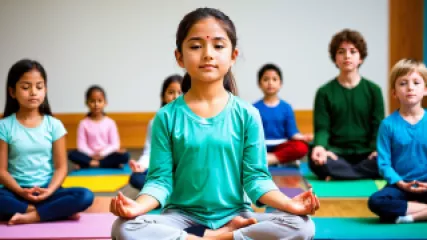Mastering Mindfulness in Education: The Ultimate Guide
Welcome to the Ultimate Guide to mastering mindfulness in education. In an era where students are constantly bombarded with distractions and stressors, incorporating mindfulness into the curriculum has become vital for promoting well-being, focus, and academic success. This guide will explore the benefits of mindfulness in education, provide practical strategies for implementing a mindfulness curriculum in schools, and highlight the importance of educational coaching services in supporting students' mindfulness practice.
Section 1: Understanding Mindfulness in Education
What is mindfulness?
Mindfulness is the practice of being fully present in the moment, without judgment or attachment to thoughts or emotions. It involves paying attention to one's thoughts, feelings, and bodily sensations in a non-reactive way. In the context of education, mindfulness cultivates self-awareness, emotional regulation, and empathy, leading to improved focus, resilience, and overall well-being.
The science behind mindfulness
Research studies have shown that practicing mindfulness can positively impact brain structure and function. Regular mindfulness practice has been associated with enhanced attention, memory, and cognitive flexibility. Moreover, mindfulness has been found to reduce stress, anxiety, and depression while promoting emotional well-being and social connectedness.
The benefits of mindfulness in education
Integrating mindfulness into the educational setting brings numerous benefits to both students and educators. Some of the key benefits include:
- Improved focus and attention: Mindfulness exercises train students to direct their attention to the present moment, enhancing their ability to stay focused on tasks and absorb information.
- Reduced stress and anxiety: Mindfulness practices help students manage stress by developing awareness of their thoughts and emotions, allowing them to respond to challenges in a more calm and composed manner.
- Enhanced emotional regulation: Mindfulness empowers students to recognize and regulate their emotions effectively, leading to improved self-control and conflict resolution skills.
- Increased empathy and compassion: By cultivating mindfulness, students develop a greater understanding of their own experiences and those of others, fostering empathy and compassion within the school community.
- Better academic performance: When students are less distracted, more focused, and emotionally balanced, they can engage more effectively in their learning, leading to improved academic outcomes.
Section 2: Implementing a Mindfulness Curriculum
Integrating mindfulness into the school day
Creating a mindful environment in schools involves infusing mindfulness practices throughout the daily routine. Here are some strategies for incorporating mindfulness into the school day:
- Morning mindfulness: Start each day with a short mindfulness practice, such as a guided breathing exercise or a gratitude reflection, to set a positive tone for the day.
- Mindful transitions: Encourage students to take a few moments of mindful awareness during transitions between activities or classes. This can involve focusing on the breath or noticing sensations in the body.
- Mindful breaks: Incorporate short mindfulness breaks throughout the day, allowing students to reset and refocus their attention. These breaks can include gentle stretching, mindful walking, or quick guided meditations.
- Integration into lessons: Infuse mindfulness into various subjects by incorporating mindful listening exercises, mindful reading practices, or mindful art activities.
- End-of-day reflection: Dedicate a few minutes at the end of the day for students to reflect on their experiences, practicing gratitude or journaling about their emotions and insights.
Training educators in mindfulness
In order to effectively implement a mindfulness curriculum, it is essential to provide training and support for educators. Offering professional development opportunities and workshops on mindfulness can equip teachers with the necessary knowledge and skills to integrate mindfulness practices into their classrooms. Educational coaching services specializing in mindfulness can also provide valuable guidance and support to educators in implementing mindfulness-based strategies in their teaching.
Section 3: The Role of Educational Coaching Services
What are educational coaching services?
Educational coaching services offer individualized support to students, helping them navigate challenges, set goals, and develop skills that promote academic success and personal growth. When it comes to mindfulness in education, educational coaches play a crucial role in supporting students' mindfulness practice.
The benefits of educational coaching services
Educational coaching services provide students with a range of benefits, including:
- Personalized guidance: Coaches work with students one-on-one, tailoring their approach to meet the unique needs and goals of each student.
- Accountability and motivation: Coaches help students stay accountable to their mindfulness practice, providing motivation and encouragement along the way.
- Stress management: Coaches teach students practical techniques for managing stress and anxiety, supporting their overall well-being.
- Goal setting and planning: Coaches assist students in setting mindfulness-related goals and developing action plans to achieve them.
- Reflection and self-awareness: Coaches facilitate reflection and self-assessment, helping students gain deeper insights into their mindfulness practice and personal growth.
Collaboration between educators and coaches
By collaborating with educational coaching services, educators can provide a comprehensive support system for students. Regular communication between teachers and coaches ensures alignment in supporting students' mindfulness practice and addressing any challenges that may arise. This collaboration fosters a holistic approach to education, focusing on both academic achievement and the development of essential life skills.
In conclusion, incorporating mindfulness in education has numerous benefits for students, educators, and the overall school community. By understanding the principles of mindfulness, implementing a mindfulness curriculum, and utilizing the support of educational coaching services, schools can create an environment that promotes well-being, resilience, and improved academic performance. Embracing mindfulness in education is a powerful step towards enhancing student focus and creating a positive and nurturing learning environment.






